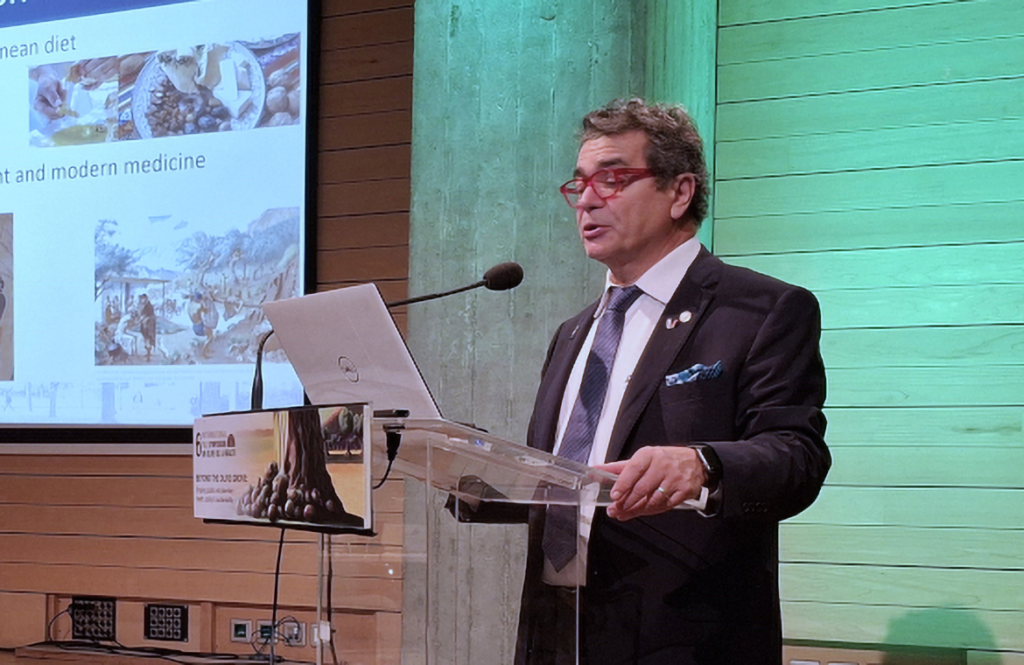At the 6th International Yale Symposium on Olive Oil and Health, Professor Vasilis Vasiliou of Yale School of Public Health updated the audience on recent research on olive oil’s health benefits. Mentioning that he has seen interest in these benefits from South Carolina to Dubai, he encouraged discussions of olive oil in terms of both gastronomy and health.
A “cornerstone of the Mediterranean diet,” as Vasiliou noted, olive oil has been recognized for its health benefits in both ancient and modern medicine. The latter especially focuses on its monounsaturated fats and phenols (natural antioxidants), but he pointed out that there are many other components in olive oil that can have a beneficial effect.
As co-organizer of the symposium held in Heraklion, Crete in December 2024, Vasiliou focused his presentation on the compelling topic The Current State of Olive Oil and Health. He provided an overview of scientific evidence for olive oil’s benefits for cardiometabolic health, neurodegenerative diseases, mental health, liver and kidney health, cancer prevention, skin and bone health, and autoimmune diseases. He also explained how extra virgin olive oil (EVOO) helps reduce oxidative stress, inflammation, blood pressure, “bad” cholesterol, blood glucose, and insulin resistance, while increasing gut microbiota diversity and having anti-bacterial and probiotic effects.
Vasiliou Explains How Olive Oil Benefits Human Health
More specifically, Vasiliou said, olive oil contributes to cardiometabolic health due to its anti-inflammatory and antioxidant effects. This reduces the risk of cardiovascular disease, reduces “bad” cholesterol (LDL), increases “good” cholesterol (HDL), reduces blood pressure, and improves insulin sensitivity.
As Vasiliou explained, olive oil’s antioxidants protect neural cells, so EVOO also improves cerebrovascular health. This translates to benefits in Parkinson’s Disease, for stroke prevention, and for enhanced amyloid-beta clearance and reduced neuroinflammation in people with Alzheimer’s.
By modulating the gut-brain axis and reducing systemic inflammation, olive oil can reduce depression and anxiety. It contributes to gut and gastrointestinal health by improving the microbiome and reducing intestinal inflammation, protecting against gastrointestinal diseases such as inflammatory bowel disease (IBD) and colorectal cancer.
By reducing oxidative stress and inflammation as well as improving lipid metabolism, olive oil helps slow the progression of non-alcoholic fatty liver disease and reduces liver fibrosis.
Phenols induce apoptosis (programmed cell death) in cancer cells, as well as inhibiting growth and angiogenesis (the development of new blood vessels) in tumors. In this way, olive oil phenols reduce the risk of breast, colon, and prostate cancers.
Olive oil also enhances bone density, reducing osteoporosis risk. Moreover, it protects against skin aging and UV damage. In addition, it helps reduce oxidative damage and inflammation in the kidneys. And it helps people with autoimmune diseases such as rheumatoid arthritis and lupus.
Vasiliou Calls for More Research, Communication, and Collaboration
Discussing advances in particular areas and with new technology, Vasiliou added that we still need to learn more about the optimal doses of olive oil for specific populations, as well as its long-term effects for diverse groups of people. He called for randomized clinical trials focused on disease-specific outcomes, plus “more mechanistic studies on phenols.”
Vasiliou explained that he and Yale Professor Tassos Kyriakides are working on creating a Yale Olive Sciences & Health program. They are also planning for a much-needed Coordinating Center for Research on Olive Sciences. This will aim to “play a pivotal role in fostering collaboration among researchers, institutions, and experts in the field” through research coordination, data sharing and analysis, communication and outreach, collaboration with industry, and policy advocacy.
As Vasiliou mentioned in a comment on another presentation at the Symposium, “you can’t change your genes, but you can change your environment, and what we eat is part of our environment.” While additional research will add to our understanding of olive oil’s benefits for human health, it is already clear that extra virgin olive oil can play an especially helpful role in a healthy diet.
The Proceedings from the 6th International Yale Symposium on Olive Oil and Health are now available online. The 7th International Yale Symposium on Olive Oil and Health will take place in New Haven, CT December 4-7, 2025. Find more information and register here.
All businesses, organizations, and competitions involved with Greek olive oil, the Mediterranean diet, and/or agrotourism or food tourism in Greece, as well as others interested in supporting Greeks working in these sectors, are invited to consider the advertising and sponsorship opportunities on the Greek Liquid Gold: Authentic Extra Virgin Olive Oil website. The only wide-ranging English-language site focused on news and information from the Greek olive oil world, it has helped companies reach consumers in more than 220 countries around the globe.
This article was originally published on Greek Liquid Gold: Authentic Extra Virgin Olive Oil (greekliquidgold.com). See that site for recipes with olive oil, photos from Greece, agrotourism and food tourism suggestions, and olive oil news and information.


Dining and Cooking